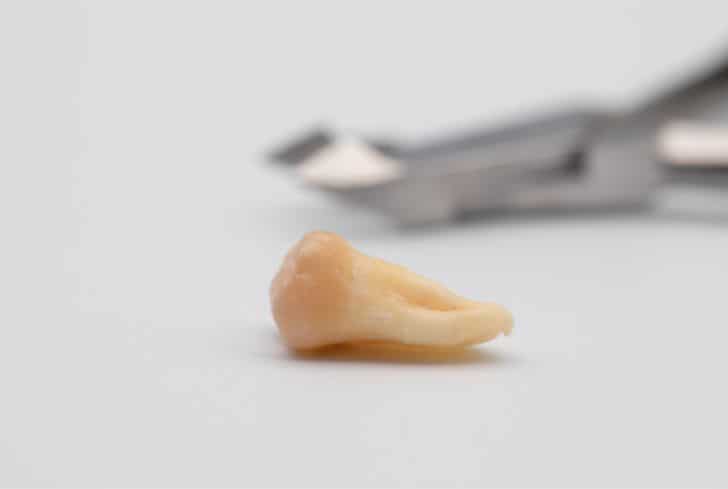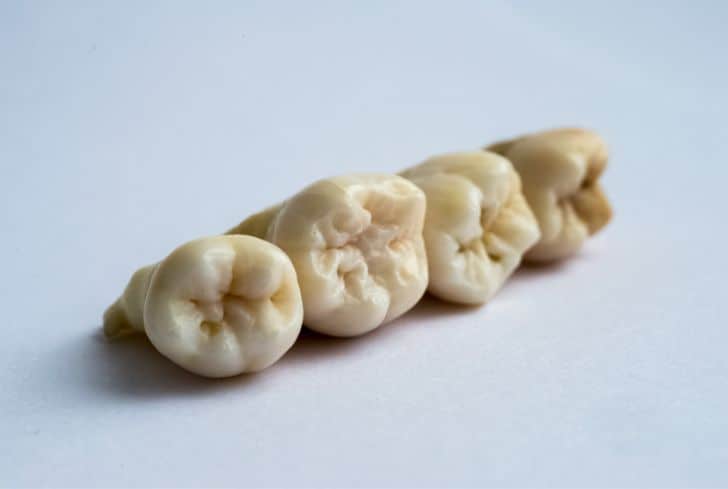Have you ever wondered what happens to teeth when they come in contact with warm, moist soil? Tooth decay is a common phenomenon in the US, and you may have treated it, especially if you love sweet and decadent treats. But if your tooth readily decays in your mouth because of the presence of bacteria, can those same bacteria break down the entire tooth structure in the soil?
Do teeth decompose after death? How long can human teeth last? And do teeth fall out during decomposition? If these questions have ever crossed your mind, this is the place where you find answers. So, don’t go anywhere!
How Long Do Teeth Take to Decompose?
Teeth may never decompose! They are just as strong as bones and can be stronger under the right conditions. Typically, the biodegradation of a material depends on environmental factors, but components like teeth and bones are strong enough to resist decay and decomposition.
Decomposition happens when there are suitable and ample microbes to hasten or aid the process. However, the bacteria that hunt the teeth upon consuming excessive sugar or sweet foods die when the body dies.
Teeth do not decompose after death, even long after the human body has decomposed. The teeth are the strongest structures in the body. They are more resilient than bones and may stick around for many decades, centuries, or even millennia.
This is because of the composition of the teeth. Even though they are made of tissues like the other parts of the human body, dentition contains the most rigid collection. The enamel, the outer layer of tissue surrounding the teeth, will break down first after mortality.
However, other components like dentin, cementum and pulp can remain intact for donkey years. This is because they contain collagen, a strong substance that may not be broken down by just any organism.
Even when moisture, microbes, aeration, and other components encourage biodegradation, teeth will remain untouched for many years.
Do Teeth Decompose in Soil?
No, teeth do not decompose in soil or anywhere, for that matter. The tooth’s structure operates so that the bacteria that cause decay become inactive after death. So, it does not matter whether there is a conducive environment for decomposition to take place – microbes and other organisms responsible for biodegradation are not strong enough to break down the tissues that form the oral structure.
Teeth and bones have similar compositions, but they are also inherently different. For one, teeth are stronger than bones, even though these structures are both made of tissues, albeit strong ones.
Four tissues make up the tooth, but only one will decompose in the soil. The enamel, the part prone to tooth decay, will break down first. However, other parts will remain even long after other parts of the body have biodegraded.
Typically, biodegradation occurs when microbes and organic matter come in contact with each other in a suitable environment. That is not to say that the teeth are not organic; they are stronger than the typical material, which breaks down faster.
The body will biodegrade in fifty years or more, depending on embalmment or other preservative measures. However, the teeth will not decay because they contain hydroxyapatite, a calcium mineral also found in rocks.

Do Teeth Decompose After Death?
No, teeth do not decompose after death, although the first layer, the enamel, will break down long before the other tissues. Teeth are durable features that can withstand decomposition.
The world is billions of years old. What do you think would happen if teeth do not decompose after death?
Billions of people have existed, and trillions of animals, extinct and otherwise, have also had their place in the world. And a large percentage of biodiversity has teeth.
In this article, you will see that scientists discovered million-year-old teeth that belonged to a mammoth. So, it is safe to say that teeth can last up to a million years at the very least.
Teeth do not decompose after death, and this is evidenced by bodies that have been exhumed legally or illegally. Of course, the practice of unearthing bodies now and then is uncommon, but the teeth and perhaps the skeletal system are two structures that tend to remain intact long after the body has decomposed.
How Long Can Human Teeth Last?
Human teeth can last an eternity. There is evidence from bodies exhumed that teeth and sometimes bones do not decompose, ever! Human teeth lose the bacteria that cause tooth decay when the body ceases to breathe, and this loss can result in eternal preservation.
Of course, the preservation techniques employed also play a significant role, sometimes keeping bodies alive and extending to longer shelf life for dentition.
Human teeth and the teeth of other mammals have been known to be incapable of decomposition. Scientists have discovered teeth from hundreds, thousands, and millions of years ago, and there is almost a certainty that the soil houses the teeth of every existing being that has been buried.
The high-functioning microorganisms and weather elements that biodegrade even the strongest organic matter (we are talking materials like latex, which takes up to four decades before breakdown occurs) cannot break down teeth but may be able to decompose bones after a very long time.
It may seem like a morbid joke, but human teeth are more durable when dead than alive. If you eat excess sugar, tooth decay is around the corner.
You can also grind your teeth to reduce their length and size. Human teeth can also be destroyed by applying enough pressure.
But the one thing that will preserve them is death. Now, isn’t that intriguing? There is a reason for it, though.
Bacteria are responsible for tooth decay but will not survive on a dead host. This means with the death of someone suffering from tooth decay comes the end of the causes of that disease.
Do Teeth Fall Out During Decomposition?
It depends, but teeth can fall out during decomposition. The human body is organic matter and susceptible to biodegradation. However, the teeth aren’t. But do you know what else is biodegradable? Structures like the gum, and this is the tissue that holds the teeth in place.
If the gum decays because of time and the presence of decomposers, then there’s no protection around the teeth. This may cause shakiness, as you can imagine. With time, whatever is left of the tissue that connects the teeth firmly to the jaw will also decompose because it is not bone or teeth.
Everything except the teeth and bone will biodegrade. Teeth will eventually come loose, especially if there were dental problems before mortality.
But the actions of microorganisms can also separate the connection between the teeth and the skeletal system. The structure that separates the jaw from the skeleton is called the fibrous ligament; you guessed it, it is organic.
With time, it will break down and melt into a liquid, leaving nothing to connect the skeleton to the teeth. However, the teeth are naturally attached to the jaw, so they may not immediately fall out when the ligament gives way.
In skeletons with stronger dental structures, it may not even happen. But again, situations where the teeth fall out can be explained by a dental deficiency or oral problems.
Another reason teeth can fall out after death is if the person had artificial dentition installed in their lifetime. The force of the strength holding the installed structure in place will loosen up when the person dies, causing the tooth or teeth to fall out.
How Long Do Teeth Last After Death?
Teeth last forever after. They do not decompose like the other body parts because they are composed of a different and stronger structure. The tissues of the teeth are resistant to decomposition factors; external and possibly artificial forces are better at destroying them than bacteria, fungi, and other microorganisms in the soil.
Even long after the skeleton has decomposed, teeth can remain intact. Bones can decompose, but the proper environmental conditions must be met.
In a humid area, biodegradation will happen fast. But in dry environments, bones can last forever! Teeth are stronger than bones, so even in humid situations, dentition can remain intact long after bones have broken down into humus.
A condition that causes dead teeth when a human or animal is still living is the only time teeth will decompose. This is because the blood supply to the structure has been cut off, but the bacteria that aid decomposition is still alive. They will thrive because the host is live and will spread the destruction to other parts of the dentition if care is not taken.
In contrast, death kills these bacteria and renders other elements of decomposition ineffective against dentition.
Conclusion
Have you ever wondered what happens to teeth after death? You would be surprised to know that mortality affects every other aspect of the body except the teeth. Even the bones will eventually break down, but there is no evidence that the teeth do too.






